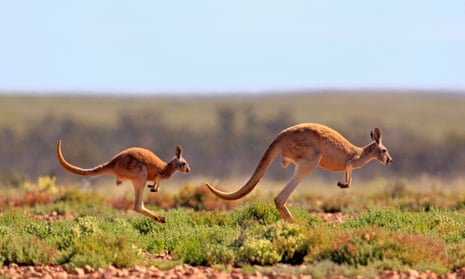A lobbying effort by the Australian government to continue the trade of kangaroo skins and meat to California has failed, with the US state set to impose a ban on the import of the animal.
An amendment to Californian law that would have allowed the import of kangaroo products from Australia beyond the end of the year failed to pass the state senate. Animal welfare groups have said the move has been defeated but the kangaroo trade industry has vowed to try again.
California banned the import of kangaroo parts in 1971. The ban stayed in place until 2007, when a moratorium allowed the sale of products such as meat and gloves made from kangaroo skin.
The moratorium is set to expire at the end of the year, which prompted a move by senate member Mike Gipson to extend the $200m industry indefinitely.
Animal welfare groups, however, have accused the Australian government of underhand tactics in lobbying the Californian senate to overturn the upcoming ban. The department of agriculture paid $143,000 to the Kangaroo Industry Association of Australia to pay US firm Manatt, Phelps and Phillips to lobby senate members.
The Food Empowerment Project has lodged an official complaint, claiming the Australian government did not properly register the lobbying. The Kangaroo Industry Association denies there was anything wrong with the lobbying.
Kim Beazley, Australia’s ambassador to the US, has voiced his support for the kangaroo trade, claiming that the four species of traded kangaroo number more than 50m, double Australia’s human population.
“The Australian government wishes to grow our strong economic ties by removing unnecessary trade barriers that are not grounded on science,” Beazley said.
“A temporary solution has been in place for years and it is now time to adopt a permanent resolution.”
But opponents of the trade say it is cruel and that government data showing that kangaroo numbers have grown healthily in recent years is misleading.
“Californians want nothing to do with Australia’s massive commercial slaughter of millions of these wonderful creatures every year,” said Wayne Pacelle, chief executive of the Humane Society of the United States.
“Companies using kangaroo skins for shoes and meat for pet food have alternatives and we call on them to stop making products from Australia’s iconic kangaroos.”
Australia’s states and territories oversee management of kangaroos and wallabies but the federal government is involved in exports. Currently, New South Wales, Queensland, South Australia and Western Australia have approved programs for the killing and export of kangaroos.
The federal government approved and oversaw the killing of 5.2m kangaroos in 2012 – up from 3.7m in 2011. Its current estimate of about 50m kangaroos is up from the 34.3m figure cited in 2011.
Last year, a government-commissioned report found that joeys suffer “severe” trauma when their mothers are shot. It added that the favoured method of killing joeys – bludgeoning them on the head – “can be effective and humane” but that improvements in the system could be made.
“Our government has been heavily lobbying California to lift this ban,” said Nikki Sutterby, of the Australian Society for Kangaroos. “It’s disturbing to see how they’ve acted over there. This industry is inhumane and cruel but despite this the government has misled the Californian senate and its people.
“Saying this trade is sustainable is a fraud. It’s just greenwashing. The government will say anything to get people to buy kangaroo.”
The Kangaroo Industry Association of Australia said the claims of animal welfare groups “don’t resemble the truth in any way.”
“Anyone who lives with kangaroos knows they are super abundant,” said John Kelly, executive officer of the association. “There are a great deal more than there used to be.
“Farmers with kangaroos on their land emailed Californian senators to tell them that controlling kangaroo numbers is vital if they’re to stay on the land. Unless they’re controlled they cause an enormous amount of damage. The kangaroo harvest is environmentally and agriculturally essential.”
He said the decline of dingoes and Indigenous hunting of kangaroos, along with the clearing of land, has created ideal conditions for the marsupials to flourish. He added that animal welfare rules for the cull are rigorous and that 90% of shot kangaroos are male, reducing the impact on joeys.

Comments (…)
Sign in or create your Guardian account to join the discussion